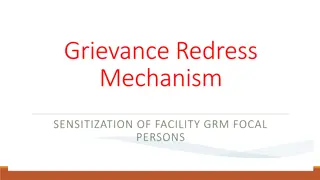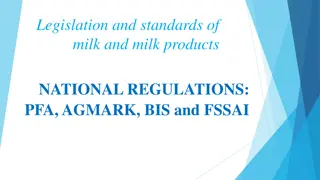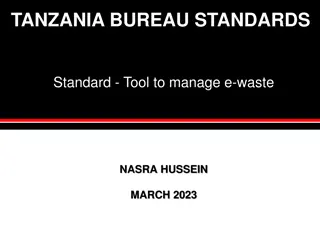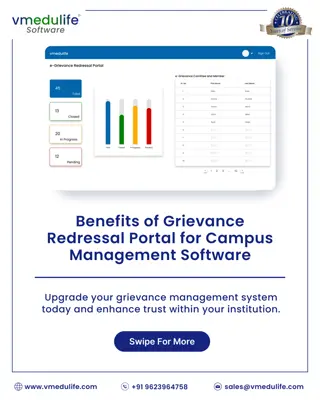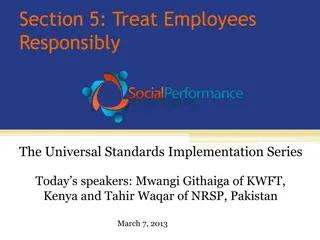Grievance Mechanisms in the World of Work Standards & Principles Workshop
This workshop focuses on improving workers' rights access to remedy through grievance mechanisms, covering the definition, relevance, factors enhancing importance, and useful contexts of these mechanisms in various work-related situations. International labor standards and principles play a crucial role in providing remedies for workers across different sectors and addressing issues such as termination of employment, unpaid wages, discrimination, and more.
Download Presentation

Please find below an Image/Link to download the presentation.
The content on the website is provided AS IS for your information and personal use only. It may not be sold, licensed, or shared on other websites without obtaining consent from the author.If you encounter any issues during the download, it is possible that the publisher has removed the file from their server.
You are allowed to download the files provided on this website for personal or commercial use, subject to the condition that they are used lawfully. All files are the property of their respective owners.
The content on the website is provided AS IS for your information and personal use only. It may not be sold, licensed, or shared on other websites without obtaining consent from the author.
E N D
Presentation Transcript
Grievance Mechanisms in the World of Work Standards & Principles Workshop on Improving workers' rights/access to remedy/grievance mechanisms EU VN DAG-to-Dag Meeting Tim De Meyer Senior Advisor on Standards Policy International Labour Office, Geneva 31 October 2023 1
1 What is a grievance mechanism at work?
mechanism handling work-related disagreements so as to offer remedy in respect of rights prevent work-related disputes identify adverse human rights impacts as part of a business due diligence not for collective interest disputes re modification of conditions of work not for disciplinary purposes range internal enterprise, sector, employees external supply chains, third parties 3
Factors enhancing the relevance of GMs today access to justice is deficient world-wide, contributing to inequality UNSG Common Agenda 5 bio division of labour as a result of GSCs and erosion of the employment relationship adding to the complexity of labour disputes UN Guiding Principles on Business and Human Rights remediation is the third pillar critical to the State s duty to protect and business duty to respect human rights weak rule of law in some jurisdictions conflict prevention becoming more important in promoting peace and resilience frequency and cost of litigation 4
2 In what sort of work-related contexts can grievance mechanisms prove useful?
classically termination of employment unpaid wages employment injury compensation migrant workers discrimination violence & (sexual) harassment indigenous peoples violation of OSH provisions supply chain context brands and suppliers 6
International labour standards re remedies seafarers protection of wages home workers domestic workers victims of forced labour victims of child labour 7
3 Where do we find ILO guidance?
Examination of Grievances Recommendation, 1967 (No. 130) possible sources of GMs principles procedures at enterprise level unsettled grievances? 9
ILO Manual on Grievance Mechanisms, 2023 context discrimination, prevention of abuse, protection of whistleblowers (Serbia) 10
4 What are some key principles governing effective grievance mechanisms?
appropriate procedure based on proper communication of policy no retaliation for using the GM subsidiarity choice of representation stakeholder involvement (transparency) right to apply to labour authority, court or judicial authority confidentiality and protection of privacy 12
Principles of effectiveness legitimacy trust and fairness accessibility predictability equity transparency rights compatibility dialogue and engagement 13



